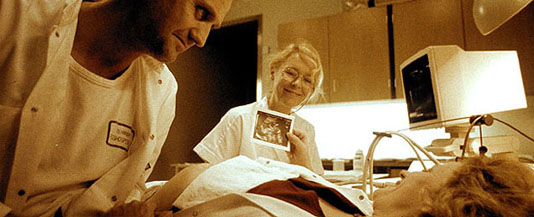|
|
Chapter Two: Riget IIBy Brett BeachOctober 28, 2010
Von Trier counteracts this by bringing together concurrent plot strands in a comical frenzy of cross-cutting that makes the case that each mini-apocalypse on the show is going to deliver more of a big bang than the last one. There is chatter from the Greek chorus of Riget (a pair of highly omniscient dishwashers) about Christmas being the time when the final battle between opposing forces will be waged. I can only imagine if von Trier would have waged a literal Celebrity Deathmatch between the Son of God and the Prince of Darkness in the third installment. The final moments of Riget II spill forth in a rousing, rising crescendo that include a head-on car crash, a freight elevator taking the express track to hell, the disappearance of a brain-damaged adolescent within the very bowels of Riget, and a hospital-wide blackout all uniting to wash the audience away on a sea of calamity. Von Trier himself appears during the closing credits of each episode with concluding observations that become steadily more cryptic and impenetrable with each passing hour. As the ringleader of this circus, he comes off as more affable and relaxed than his reputation might suggest. Then again, he also looks convincing throwing up devil’s horns with his fingers. Epilogue: Proving that it does pay to stay through the credits, I discovered last night that there is nearly half a minute of footage at the end of the last episode that did not get played when I saw the film in the theater. And yet one more cliffhanger… If I have perhaps undersold the originality of the show and its ability to undermine the mundane with a creepiness and dread that roll in like the fog, it’s only because I really, really love the opening two minutes and it’s hard to accept that the show doesn’t entirely live up to that promise. Next time: For 35 years we’ve all been doing the Time Warp (again), but for nearly three decades, you could also have been “Bitchin’ in the Kitchen” in Denton, USA. Have you? An unheralded Chapter Two get its due.
|

|
|
|

|
Friday, November 1, 2024
© 2024 Box Office Prophets, a division of One Of Us, Inc.


